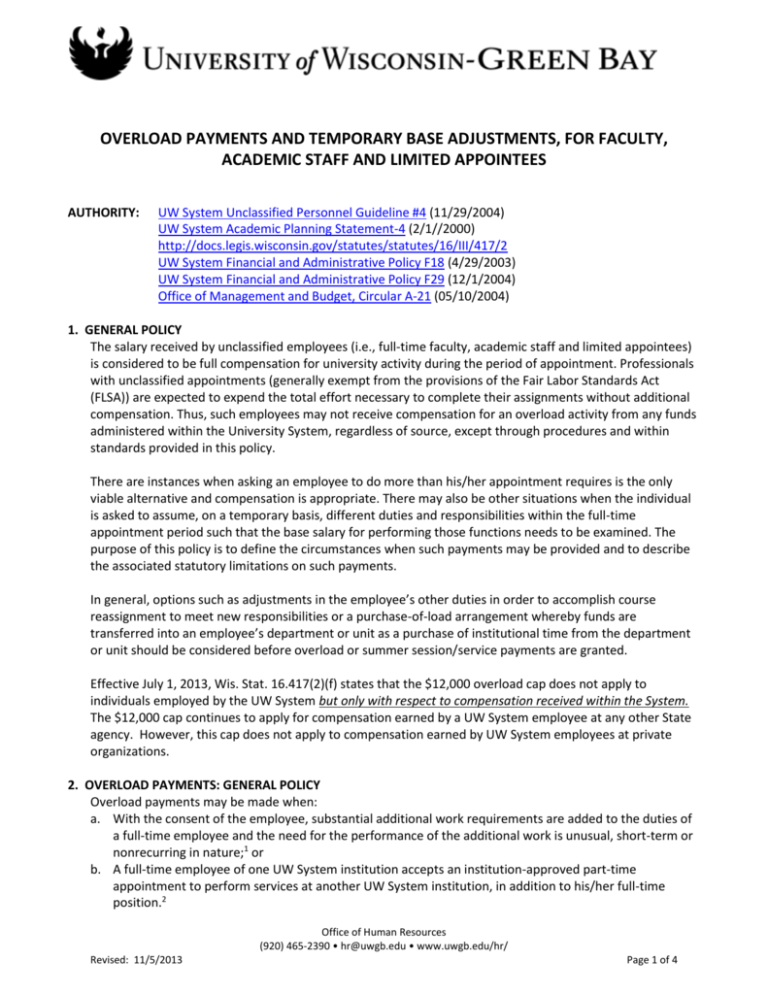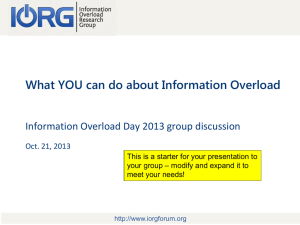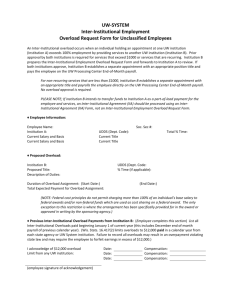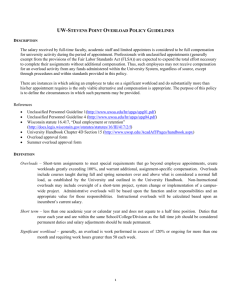Overload Payment Policy
advertisement

OVERLOAD PAYMENTS AND TEMPORARY BASE ADJUSTMENTS, FOR FACULTY, ACADEMIC STAFF AND LIMITED APPOINTEES AUTHORITY: UW System Unclassified Personnel Guideline #4 (11/29/2004) UW System Academic Planning Statement-4 (2/1//2000) http://docs.legis.wisconsin.gov/statutes/statutes/16/III/417/2 UW System Financial and Administrative Policy F18 (4/29/2003) UW System Financial and Administrative Policy F29 (12/1/2004) Office of Management and Budget, Circular A-21 (05/10/2004) 1. GENERAL POLICY The salary received by unclassified employees (i.e., full-time faculty, academic staff and limited appointees) is considered to be full compensation for university activity during the period of appointment. Professionals with unclassified appointments (generally exempt from the provisions of the Fair Labor Standards Act (FLSA)) are expected to expend the total effort necessary to complete their assignments without additional compensation. Thus, such employees may not receive compensation for an overload activity from any funds administered within the University System, regardless of source, except through procedures and within standards provided in this policy. There are instances when asking an employee to do more than his/her appointment requires is the only viable alternative and compensation is appropriate. There may also be other situations when the individual is asked to assume, on a temporary basis, different duties and responsibilities within the full-time appointment period such that the base salary for performing those functions needs to be examined. The purpose of this policy is to define the circumstances when such payments may be provided and to describe the associated statutory limitations on such payments. In general, options such as adjustments in the employee’s other duties in order to accomplish course reassignment to meet new responsibilities or a purchase-of-load arrangement whereby funds are transferred into an employee’s department or unit as a purchase of institutional time from the department or unit should be considered before overload or summer session/service payments are granted. Effective July 1, 2013, Wis. Stat. 16.417(2)(f) states that the $12,000 overload cap does not apply to individuals employed by the UW System but only with respect to compensation received within the System. The $12,000 cap continues to apply for compensation earned by a UW System employee at any other State agency. However, this cap does not apply to compensation earned by UW System employees at private organizations. 2. OVERLOAD PAYMENTS: GENERAL POLICY Overload payments may be made when: a. With the consent of the employee, substantial additional work requirements are added to the duties of a full-time employee and the need for the performance of the additional work is unusual, short-term or nonrecurring in nature;1 or b. A full-time employee of one UW System institution accepts an institution-approved part-time appointment to perform services at another UW System institution, in addition to his/her full-time position.2 Office of Human Resources (920) 465-2390 • hr@uwgb.edu • www.uwgb.edu/hr/ Revised: 11/5/2013 Page 1 of 4 1 2 An example is a faculty member who teaches a course scheduled during the academic year that results in a teaching load that exceeds the institution’s regular expected teaching load for the academic year. Examples include a full-time lecturer who accepts an appointment to teach a weekend course at another institution during the appointment period; or a staff member who continues to work full-time at his/her home institution while filling a position at another institution during recruitment. 3. OVERLOAD PAYMENTS: GENERAL PAYMENT LIMITATIONS a. Approvals for all overload payments must be obtained from chair/director, the Division Head and Area Leader (or designee) prior to the starting date of the overload service. Exceptions will be made only for the most extraordinary circumstances (such as sudden illness, death, or other circumstances that could not have been anticipated). The attached Request for Overload Payment form must be used whenever a request is made. b. Overload compensation may not exceed the higher of either 20 percent (20%) of the employee’s academic (c-basis/9 month) or annual (a-basis/12 month) or $18,000 unless the chancellor or designee determines that good cause exists to exceed this threshold and issues an exception in writing. c. The statutory limit is calculated on a fiscal year basis (July 1 through June 30 of the following year). In determining whether the workload limit has been met, the controlling factor is the period when the overload assignment occurs. In consideration of institutional flexibility and by Chancellor exemption compensation earned during J-term will not be considered in determining whether the 20% or $18,000 limits are exceeded. d. Federal cost principles do not permit charging more than 100% of an individual's base salary to federal awards and/or nonfederal funds that are used as cost sharing on a federal award. Individuals on federal funding will not be eligible for overload payments no matter the source of additional funding. The only exception to this restriction is where the arrangement has been specifically provided for in the award or approved in writing by the sponsoring federal agency. e. Overload payments received for non-instructional assignments are at the discretion of the Division Head and Area Leader. f. For information related to summer session service payments for academic year and faculty employees for teaching, research see “Summer Session/Summer Service Policy.” g. Temporary base salary adjustments (See Section 8 of this policy) are not considered overload payments. 4. OVERLOAD PAYMENTS: SPECIAL REQUIREMENTS AND LIMITATIONS IN SPECIFIC SITUATIONS For additional information regarding topics in this section see UW System Academic Planning Statement-4 “UW System Policy on Academic Year Definition and Assorted Derivatives”. a. Courses taught during the academic year. Employees may receive overload payments for teaching courses scheduled during the academic year when the addition of the course(s) results in a teaching load that exceeds the employee’s contractual teaching load for the entire academic year. b. Inter-institutional instructional consulting or technical service on an overload basis. Sharing of expertise among various UW System units is considered part of what is expected of employees as part of their fulltime employment. However, where the need for this inter-institutional service is in addition to a fulltime appointment at the “home” institution and is short-term in nature, compensation on an overload basis may be appropriate. c. Off-campus credit instruction. When taught by full-time faculty members during their appointment period, off-campus courses generally should be considered part of an individual’s full-time teaching load. In order to maintain flexibility in the use of instructional funds or to adapt off-campus offerings to rapidly changing needs, however, overload payments may be requested by Outreach and Adult Access, Office of Human Resources (920) 465-2390 • hr@uwgb.edu • www.uwgb.edu/hr/ Revised: 11/5/2013 Page 2 of 4 subject to the approval of the chair of the faculty member’s budget unit, the appropriate Dean, and the Provost and Vice Chancellor for Academic Affairs (or designee). A historic UW System standard that no more than one-third of the staffing of off-campus credit instruction should be provided through overload or ad hoc arrangements is no longer feasible or desirable. This policy exempts the Division of Outreach and Adult Access from that constraint. The use of overload payments and ad hoc arrangements for off-campus credit instruction shall be monitored by the Associate Provost for Outreach and Adult Degree Programs and reported to the Provost and Vice Chancellor for Academic Affairs by February 1 of each year for the previous calendar year. d. Non-credit continuing education and public service programs. The University of Wisconsin System commits itself to respond to the continuing education and public service needs of Wisconsin residents. To the extent that these needs can be anticipated for any regular budget period, budget arrangements should be developed to structure such assignments as part of the regular load of full-time faculty members. If these assignments have not been anticipated, or cannot be accommodated in the regular load, overload payments may be authorized according to the policy and limits established in accord with this policy document. 5. OVERLOAD PAYMENTS: SPECIAL CONSIDERATIONS FOR ACADEMIC STAFF The rare non-instructional circumstances under which an overload payment for an academic staff may be appropriate and approved can be recognized according to the following principles: a. The extra work is not due to a vacancy in the department. b. The supervisor, division head, and area leadership have explored options and concluded that this is an option of last resort. c. It is established that an employee cannot reasonably be expected to do the work in question during the normal work week. d. The task requires specialized expertise that is not otherwise available. e. The exigency is not part of a regular, predictable workload, but rather is unforeseen and extraordinary. f. The magnitude of the work cannot be accommodated by flexible work schedules. g. The overload is formally approved by signature of the Area Leader after consultation with the Institutional Officers and before the work for overload pay is undertaken. Academic staff may accept occasional instructional assignments that are outside of and in addition to their assigned positions. In those cases, the use of an overload payment may be appropriate. 6. OVERLOAD PAYMENTS: MONITORING The Provost’s Office, in cooperation with the appropriate Division Leader (or designee) shall be responsible for monitoring overload payments and shall provide the UWS Office of Academic Affairs, upon request, a list of persons receiving overload payments. Each division shall be responsible for monitoring overload payments in all other areas on campus. 7. OVERLOAD PAYMENTS: CALCULATION Overload payments must be reasonable in terms of the original base salary and the time spent, effort involved, and level of skills required for the additional assignment. Calculation of overload payments shall be made pursuant to the methodology set forth in Salary and Fringe Benefits Calculations for Unclassified Staff (F29) and Inter-Institutional Financial Transactions (F18). Office of Human Resources (920) 465-2390 • hr@uwgb.edu • www.uwgb.edu/hr/ Revised: 11/5/2013 Page 3 of 4 8. TEMPORARY BASE ADJUSTMENTS Temporary base salary adjustments should be utilized in cases where an employee is appointed in an acting or interim capacity, or to assume temporary responsibilities that are significantly different from those of the employee’s current position. These adjustments do not constitute overload payments. The level of the base salary adjustment appropriate for the new assignment is determined pursuant to UPG 4.08 These policies and procedures (and attached forms) are approved by the Chancellor: ____________________________________________________ __________ Thomas K. Harden, Chancellor Date Office of Human Resources (920) 465-2390 • hr@uwgb.edu • www.uwgb.edu/hr/ Revised: 11/5/2013 Page 4 of 4






